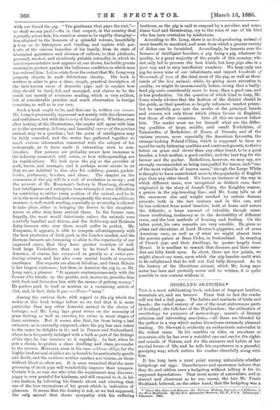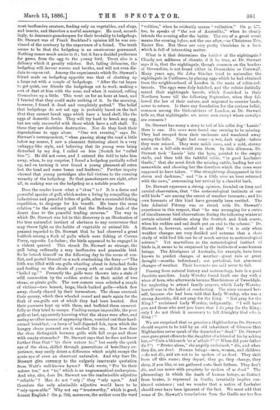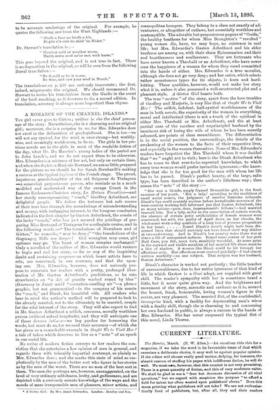HIGHLAND SKETCHES.*
Tiiis is a most exhilarating book, redolent of fragrant heather, mountain air, and sea breezes. From first to last the reader will not find a dull page. The habits and instincts of birds and beasts ; the varied scenery of one of the most picturesque parts of Scotland ; the folk-lore of the Highlanders; the utilisation of ornithology for purposes of meteorology ; morsels of literary criticism and interesting anecdotes,—all these are blended by the author in a way which makes his volume extremely pleasant reading. Dr. Stewart is evidently an enthusiastic naturalist in the widest sense. In his rambles or rides on sea-shore or mountain-side he has ever a watchful eye and ear for the sights and sounds of Nature, and for the manners and habits of her myriad forms of life, and he tells his experiences in a graceful, gossiping way, which entices his readers cheerfully along with him.
It has long been a moot point among naturalists whether hedgehogs eat eggs. Gamekeepers and sportsmen believe that they do, and seldom pass a hedgehog without killing it for its supposed depredations. That most merry of naturalists, and as shrewd and observant as he was merry, the late Mr. Frank Buckland, believed, on the other hand, that the hedgehog was a • 'Twist Ben Nevis and Glencoe: the Nat ural History, Legrncle. and Folk-lore of the West Highlands. By the Ray. Alexander Stewart, LL.D., F.8.&. Edithargh : Paterson. 1885. most inoffensive creature, feeding only on vegetables, and slugs, and insects, and therefore a useful scavenger. He used, accord- ingly, to denounce gamekeepers for their brutality to hedgehogs. Dr. Stewart was of Frank Buckland's opinion till he was con- vinced of the contrary by the experience of a friend. The truth seems to be that the hedgehog is an omnivorous gourmand. Nothing comes much amiss to it ; but it has a decided preference for game, from the egg to the young bird. Trout also is a delicacy which it greatly relishes. But, failing delicacies, the hedgehog will devour worms and beetles, and will not even dis- dain to sup on rat. Among the experiments which Dr. Stewart's friend made on hedgehog appetite was that of shutting up a large rat with a couple of hedgehogs. "After the rat began to get quiet, our friends the hedgehogs set to work, making a sort of dart at him with the nose, and when it resisted, rolling themselves up a little. This went on for an hour at least, and I fancied that they could make nothing of it. In the morning, however, I found it dead and completely gutted." The belief that hedgehogs do not eat egg is probably based on the fact that they cannot break eggs which have a hard shell, like the eggs of domestic fowls. They will try hard to break any egg, but are only successful with those which have a soft shell. To these they are doubtless destructive. Nor do they limit their depredations to eggs alone. "One wet evening," says Dr. Stewart's correspondent, "when passing along the road a little below my manse, I saw a pheasant fluttering about in a very unhappy-like style, and believing that its young were being disturbed by my dog, I called on him [Scotch for "called him"]. He did not come, and I entered the field to take him away, when, to my surprise, I found a hedgehog partially rolled up, and on turning it over found a young pheasant all eaten but the head and some bones and feathers." Further inquiry showed that young partridges also fall victims to the cunning voracity of the hedgehog. So that gamekeepers are right, after all, in making war on the hedgehog as a notable poacher.
Does the reader know what a " skua " is P It is a fierce and powerful species of gull, which makes a living by compelling the industrious and peaceful tribes of gulls, after a successful fishing expedition, to disgorge for his benefit. He bears the same relation "to the ordinary gull that the Bedouin Arab of the desert does to the peaceful trading caravan." The way in which Dr. Stewart was led to this discovery is an illustration of the true naturalist instinct of alertness to any occurrence that may throw light on the habits of vegetable or animal life. A peasant reported to Dr. Stewart that he had observed a great hubbub among a flock of gulls which were fishing at Corrau Ferry, opposite Lochaber ; the birds appeared to be engaged in a violent quarrel. This struck Dr. Stewart as strange, the gull being ordinarily a very inoffensive and peaceable bird. So be betook himself on the following day to the scene of con- flict, and posted himself on a rock overlooking the ferry :—" The frith was filled with sea-gulls wheeling about in detached flocks and feeding on the shoals of young seth or coal-fish as they 4 boiled up.'" Presently the gulls were thrown into a state of wild commotion by the sudden arrival in their midst of two skuas, or pirate gulls. The new-comers soon selected a couple of victims—two honest, large, black-backed gulls—which flew away, closely chased by their tormentors. The skuas overtook their quarry, which then wheeled round and made again for the flock of sea-gulls out of which they had been hunted. But their pursuers kept up with them, and buffeted them unmerci- fully as they tried to escape. Finding escape impossible, the poor gulls at last, apparently knowing what the sknas were after, and seeing no other means of appeasing them, vomited out their hard- earned breakfast,—a lump of half-digested fish, upon which the hungry sknas pounced ere it reached the sea. But how does the skua distinguish between gulls with full crops and those with empty stomachs ? Dr. Stewart says that he does not know further than that" 'tis their nature to ;" but surely the quick eye of the skua, skilled through generations of hereditary ex- perience, may easily detect a difference which might escape the acute eye of even an observant naturalist. And why does Dr. Stewart give currency to the vulgarly inaccurate quotation from Watt's well-known hymn ? Watt wrote, "For 'tis their nature too," not "to," which is an ungrammatical cockneyism. And why, also, does Dr. Stewart use the inadmissible adjective 4' reliable" ? lien do not "rely ;" they "rely upon." And therefore the only admissible adjective would have to be 4' rely-upon-able." Why not say "trustworthy," which is good; honest English ? On p. 380, moreover, the author uses the word "volition," when he evidently means " volitation." On p. 271, too, he speaks of "the eve of Austerlitz," when he clearly intends the evening after the battle. The eve of a great event means the evening before, not the one after,—as Christmas Eve, Easter Eve. But these are very pretty blemishes in a book which is full of interesting matter.
What is it that determines the habitat of the nightingale ? Clearly not mildness of climate, if it be true, as Dr. Stewart says it is, that the nightingale, though common on the borders of Devonshire, is not found either in Devonshire or Cornwall. Many years ago, Sir John Sinclair tried to naturalise the nightingale in Caithness, by placing eggs which he had obtained from the neighbourhood of London in the nests of robin-red- breasts. The eggs were duly hatched, and the robins dutifully reared their nightingale broods, which flourished in their Northern home till the following September, when they fol- lowed the law of their nature, and migrated to sunnier lands, never to return. Is there any foundation for the curious belief, common among the bird-catchers of London, as Dr. Stewart tells us, that nightingales are never seen except where cowslips are common ?
Dr. Stewart has many a story to tell of his collie dog Lassie.' Here is one. His cows were found one evening to be missing. They had escaped from their enclosure and wandered away among the hills. Night had come—a wet, dark night—before they were missed. They were milch cows, and a cold, stormy night on a hill-side would ruin them. In this dilemma, Dr. Stewart took 'Lassie' into the byre, pointed to the empty stalls, and then told the faithful collie, "in good Lochaber Gaelic," that she must fetch the missing cattle, leading her out meanwhile and showing her the direction which the cows were supposed to have taken. "She straightway disappeared in the storm and darkness," and "in a little over an hour returned with the cows," announcing her arrival by a cheerful bark.
Dr. Stewart expresses a strong opinion, founded on long and careful observation, that "the meteorological instincts of our wild birds" are among the surest of weather forecasts ; and his own forecasts of this kind have generally been verified. The late Admiral Fitzroy was so struck with Dr. Stewart's experience in this respect, that "he was arranging for a series of simultaneous bird observations during the following winter at certain selected stations along the Scottish and Irish coasts, when his sudden and sad death put an end to the scheme." Dr. Stewart is, however, careful to add that "it is only when weather changes are very decided and extreme that a close study of wild-bird life can be of much service to meteorological science." Yet marvellous as the meteorological instinct of birds is, it seems to be surpassed by the instincts of some human beings. The Aborigines of Australia, for example, have been known to predict changes of weather—great rain or great drought—months beforehand ; not periodical, but abnormal changes of weather. Their forecasts are said never to fail.
Passing from natural history and meteorology, here is a good Jacobite anecdote. Lady Worsley found fault one day with a niece of hers, who afterwards became Marchioness of Tweeddale, for neglecting to attend family prayers, which Lady Worsley- herself was in the habit of conducting. The niece excused her- self, because she had been told that Lady Worsley, who was a strong Jacobite, did not pray for the King. " Not pray for the King ? " exclaimed Lady Worsley, indignantly. "I will have you and those who sent you know that I do pray for the King ; only I do not think it necessary to tell Almighty God who is King ! "
We are surprised that so genuine a Highlander as Dr. Stewart should require to be told by an old inhabitant of Glencoe that Highlanders never speak of the departed as "dead." Dr. Stewart once gave great offence to the daughter of a friend of his by asking her,—" Coin a bhitsarch 'urn' athair ?" (" When did your father die ?") "Brutes alone," she angrily exclaimed, "die, and when they die, are dead. Human beings —men, women, and children —do not die, and are not to be spoken of as dead. They shift from off this scene; they depart, they go, they change, they sleep, if you like, or are gathered unto their fathers. They don't die, and can never with propriety be spoken of as dead." The phraseology in which the death of human beings, as distinct from brutes, is expressed in Gaelic, invariably implies con- tinued existence ; and we wonder that a native of Lochaber should ever have been ignorant of the fact. We must add that some of Dr. Stewart's translations from the Gaelic are too free
to be accurate renderings of the original. For example, he quotes the following saw from the West Highlands :—
" Biodh e fear no biodh e
Bi glic a's cuir do shiol 'sa Mart."
Dr. Stewart's translation is
:-
"Weather cold or weather warm, March-sown seed ne'er met with harm."
This goes beyond the original, and is not true in fact. There is no dogmatism in the original, as will be seen from the following literal translation :—
"Be it cold or be it warm, Be wise, and eew your seed in March."
The translations on p. 239 are seriously inaccurate ; the first, indeed, mispresents the original. We should recommend Dr. Stewart to revise his translations from the Gaelic in the event of the book reaching, as it deserves to do, a second edition. In translation, accuracy is always more important than rhyme.








































 Previous page
Previous page